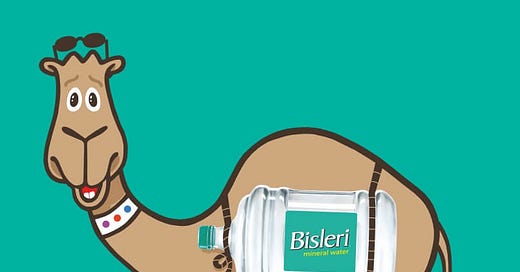How Bisleri became synonymous with water in India!
Nearly 30 years after selling his iconic roster of soft drinks including Thums Up, Gold Spot & Limca to Coca Cola in 1993, Ramesh Chauhan of Parle Group is all set to crack another massive deal in the beverage industry in India. Tata Consumer is all set to acquire India’s largest packaged drinking water company, Bisleri, for up to INR 7000 crores. This is one of the biggest acquisitions in the beverage industry in India and could change the overall dynamics of the packaged drinking water market. With nearly 32% market share of the organized packaged drinking water industry in India, Bisleri is the undisputed leader in the market. But how did Bisleri become the giant that it is today? How did Bisleri become synonymous with water in India by becoming the most popular bottled water brand in the country? In this article, we trace the roots of Bisleri & how Ramesh Chauhan breathed a new lease of life into the now iconic brand before deciding to pass it on to the legendary Tata Group.
Creator Economy:
In this episode, Bhavjeet and Anirudh discuss the booming "creator economy" as more and more people across the globe are dabbling in various types of content creation. Check out the different ideas in the episode:
The story of Bisleri began far away in Italy in the year 1851, when an Italian businessman, inventor & chemist by the name of Signor Felice Bisleri decided to launch Bisleri as an alcohol hangover remedy made of cinchona, herbs & iron salts. After the demise of Felice Bisleri, the company was passed on to Dr. Cesare Rossi, a family doctor and close friend of Bisleri. It was Rossi who pivoted the Bisleri company to start a packaged water business. Soon Rossi began expanding the business to other markets and decided to partner with Khushroo Suntook, an Indian lawyer by profession and the legal counsel for the Bisleri company, to launch Bisleri in India. With the help of Suntook, Bisleri set up its first bottling plant in Thane in 1965. Initially, people declared Rossi & Suntook mad for selling a commodity like water in India. However, the duo kept on working on creating a market for Bisleri in the country. At the time, the quality of drinking water in India was bad to say the least. Thus, for the affluent & foreign tourists in fancy hotels, Bisleri was nothing less than a nectar! The company initially launched mineral water & soda for this affluent class and started taking hold in the Indian market by focusing on the premium customer initially.
Despite their initial success, both Rossi & Suntook understood that they could not rely on just the premium market segment if they were to survive and thrive in the business of packaged water. They began to expand their product range to reach the mass market, but the strategy did not work as planned. Seeing the writing on the wall, the duo eventually decided to sell the company. Thus, in 1969, the Chauhan brothers of Parle took over the Bisleri company for just INR 4 lakh as the market for packaged beverages like cold drinks and soda was heating up in India. At the time, both Parle and Coca Cola were head to head in the race to dominate the growing Indian carbonated & non-carbonated beverages market. Parle began introducing new products under the Bisleri brand and soon Bisleri became popular in the Indian market. Parle & Ramesh Chauhan breathed a new lease of life into the struggling company and it soon began taking over the market. Despite stiff competition, Bisleri was able to maintain a dominant hold over the packaged drinking water market in India over the years.
By 2018, Bisleri had grown to reach an annual revenue of INR 1500 crores. As of 2020, Bisleri was operating 122 bottling plants that churned out 15 crores bottles every single month! The brand has an extensive distribution network comprising over 4500 distributors & 5000 distribution trucks in India and neighboring countries. Despite the incredible growth and financial success of the Bisleri brand, Ramesh Chauhan decided to sell Bisleri and began looking for possible suitors for acquisition. Since his daughter Jayanti was not interested in running the business, Ramesh Chauhan had to take the tough decision to sell off Bisleri. Owing to his age & health concerns, had to find a way to keep the brand alive and kicking somehow. Selling off the brand, although painful, seemed the right thing to do. Chauhan reviewed bids from a host of interested parties including Danone and Reliance, but ultimately decided to move forward with Tata since he liked their company culture. The acquisition makes a lot of sense for Tata as well since it is already a player, albeit a smaller one, in the packaged drinking water category with Himalaya and Tata Copper Plus brands. The acquisition of Bisleri would propel Tata to the number one position in the packaged drinking water industry in India. The question now is - where does Tata take the Bisleri brand from here?



